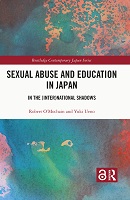Chapter 3 In the shadow of male hysteria
Proposal review
International status anxiety
| dc.contributor.author | O’Mochain, Robert | |
| dc.contributor.author | Ueno, Yuki | |
| dc.date.accessioned | 2023-06-20T06:24:01Z | |
| dc.date.available | 2023-06-20T06:24:01Z | |
| dc.date.issued | 2023 | |
| dc.identifier.uri | https://library.oapen.org/handle/20.500.12657/63490 | |
| dc.description.abstract | This chapter develops an argument regarding previously neglected factors that enrich our understanding of why female victims of sexual assault find it difficult to come out of the shadows and to pursue justice. It focuses on the role of powerful conservative revisionists who, under impulses that range from anxious to hysterical, promote an association of ideas between former “comfort women” and those women who seek justice in the aftermath of sexual violence. A historical perspective of Japan indicates transmission of anxiety, rather than a more intense level of hysteria, but there may be influential groups within society that adopt the position of the hysteric. The case of Itō Shiori is detailed to exemplify a toxic association of ideas propounded by ideological extremists, to illustrate the difficulties involved for women who speak out against male sexual violence, and to highlight the potential for women to meet these challenges, in spite of the danger of retaliation. A survey of 100 female university students asked how likely these young women were to report sexual harassment according to the profession of the perpetrators. The survey indicates that a fear of retaliation from extremist groups may inhibit reporting of sexual abuse. | en_US |
| dc.language | English | en_US |
| dc.subject.classification | thema EDItEUR::J Society and Social Sciences::JB Society and culture: general::JBS Social groups, communities and identities::JBSF Gender studies, gender groups::JBSF1 Gender studies: women and girls::JBSF11 Feminism and feminist theory | en_US |
| dc.subject.classification | thema EDItEUR::G Reference, Information and Interdisciplinary subjects::GT Interdisciplinary studies::GTM Regional / International studies | en_US |
| dc.subject.classification | thema EDItEUR::J Society and Social Sciences::JB Society and culture: general::JBF Social and ethical issues::JBFK Violence and abuse in society::JBFK2 Sexual abuse and harassment | en_US |
| dc.subject.other | MeToo; Comfort Women; Nationalism; Sexual Harassment; Toxic Masculinity; Misogyny; higaisha-buru; status anxiety; male hysteria; nativism | en_US |
| dc.title | Chapter 3 In the shadow of male hysteria | en_US |
| dc.title.alternative | International status anxiety | en_US |
| dc.type | chapter | |
| oapen.identifier.doi | 10.4324/9781003307662-6 | en_US |
| oapen.relation.isPublishedBy | 7b3c7b10-5b1e-40b3-860e-c6dd5197f0bb | en_US |
| oapen.relation.isPartOfBook | ef36cf1f-2ea4-40fb-a070-f22bea041a4f | en_US |
| oapen.relation.isFundedBy | 92dc57a0-15aa-41a2-9337-b60ff76bfe4e | en_US |
| oapen.relation.isbn | 9781032310237 | en_US |
| oapen.relation.isbn | 9781032310244 | en_US |
| oapen.imprint | Routledge | en_US |
| oapen.pages | 28 | en_US |
| peerreview.anonymity | Single-anonymised | |
| peerreview.id | bc80075c-96cc-4740-a9f3-a234bc2598f1 | |
| peerreview.open.review | No | |
| peerreview.publish.responsibility | Publisher | |
| peerreview.review.stage | Pre-publication | |
| peerreview.review.type | Proposal | |
| peerreview.reviewer.type | Internal editor | |
| peerreview.reviewer.type | External peer reviewer | |
| peerreview.title | Proposal review | |
| oapen.review.comments | Taylor & Francis open access titles are reviewed as a minimum at proposal stage by at least two external peer reviewers and an internal editor (additional reviews may be sought and additional content reviewed as required). |

